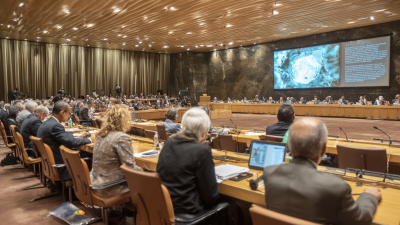The imperative for global sustainability has never been more urgent, as we face an accelerating climate crisis alongside dwindling natural resources. According to the Intergovernmental Panel on Climate Change (IPCC), we have a mere decade left to substantially reduce greenhouse gas emissions to avert catastrophic climate impacts. In this critical context, the United Nations Environment Programme (UNEP) is at the forefront of innovative strategies aimed at fostering environmental resilience and promoting sustainable practices across nations. Through programs that address everything from ecosystem restoration to climate adaptation, UNEP plays a pivotal role in shaping international sustainability agendas. Recent studies indicate that global investments in sustainable development could yield a return of up to $30 trillion by 2030, underscoring the significance of UNEP's work in guiding these transformative initiatives. This blog will explore seven innovative ways UNEP is influencing global sustainability efforts, providing insight into its comprehensive approach to environmental stewardship.

The United Nations Environment Programme (UNEP) has been a pivotal force in advancing global sustainability, particularly through its innovative partnerships with non-governmental organizations (NGOs). These collaborations leverage the unique strengths of each partner, creating impactful solutions to some of the most pressing environmental challenges of our time. By tapping into the grassroots networks and local expertise of NGOs, UNEP can implement sustainable initiatives that are both culturally relevant and effective.
One notable example is UNEP's partnership with NGOs focused on combating plastic pollution. Through joint campaigns and community workshops, they educate individuals on the detrimental effects of single-use plastics and promote alternatives. These initiatives not only aim to reduce plastic waste but also empower communities by fostering a sense of ownership and responsibility toward their environment. The synergy between UNEP and these NGOs exemplifies how collective efforts can lead to significant progress in sustainability, inspiring similar collaborations worldwide.
The United Nations Environment Programme (UNEP) plays a crucial role in advancing global sustainability through innovative initiatives that facilitate circular economy practices. By rethinking solid waste management, UNEP emphasizes waste reduction, reusability, and recycling, which are essential for transforming waste into valuable resources. This approach not only addresses the growing waste crisis but also contributes to combating climate change, biodiversity loss, and pollution.

One effective way to embrace these principles is through community engagement and education. Here are some tips to promote circular economy practices at the local level:
By implementing these strategies, communities can contribute to a more sustainable future while supporting UNEP's mission to shape a cleaner, healthier planet through informed waste management practices.
The United Nations Environment Programme (UNEP) plays a pivotal role in promoting environmental legislation and driving climate action across the globe. According to the latest Global Environment Outlook report, only 30% of countries have enacted comprehensive climate legislation, highlighting the urgent need for more robust policies. UNEP actively supports nations in developing integrated strategies that intertwine climate goals with economic growth, emphasizing the importance of sustainable practices in all sectors.
One effective approach UNEP employs is the facilitation of international dialogues to harmonize environmental laws and standards. For instance, the UNEP’s Global Program of Action for the Protection of the Marine Environment from Land-Based Activities encourages countries to collaborate on reducing marine pollution, which affects nearly 80% of the world’s oceans. Tips for policymakers include prioritizing cross-sectoral policies and encouraging stakeholder participation to ensure sustainable outcomes.
Additionally, UNEP leverages scientific research to drive policy formulation. The organization participates in forums like the United Nations Framework Convention on Climate Change (UNFCCC), offering evidence-based recommendations that help shape national commitments. To strengthen climate policy efficacy, governments are encouraged to integrate local community input into the decision-making process, ensuring that policies are not only eco-friendly but also socially equitable.
The United Nations Environment Programme (UNEP) plays a pivotal role in shaping global sustainability by driving the Sustainable Development Goals (SDGs). These 17 interconnected goals highlight the urgent need to address environmental challenges while promoting economic and social growth. UNEP’s influence can be seen through its initiatives that foster collaboration across nations, encouraging policies that integrate sustainable practices into national development frameworks.
One of the ways UNEP is making a tangible impact is through capacity-building programs. By empowering countries to develop their own sustainability strategies, UNEP helps ensure that local contexts and needs are considered, driving more effective outcomes. This collaborative approach not only supports the implementation of SDGs but also strengthens resilience against environmental changes.
**Tips for Engaging with UNEP’s Initiatives:**
1. **Participate Actively**: Engage with UNEP projects in your community to understand better how global goals translate locally.
2. **Educate Yourself and Others**: Stay informed about the SDGs and share information within your network to foster awareness and involvement.
3. **Advocate for Policy Change**: Use your voice to support policies that align with the principles of sustainability and environmental justice, ensuring that broader frameworks reflect the urgency of climate issues.
| Strategy | Description | Area of Impact | Target Year |
|---|---|---|---|
| Ecosystem Restoration | Promoting the restoration of degraded ecosystems to enhance biodiversity and ecosystem services. | Biodiversity | 2030 |
| Sustainable Agriculture | Implementing practices that promote sustainable food production and reduce environmental impact. | Food Security | 2025 |
| Pollution Control | Initiatives aimed at reducing air, water, and soil pollution globally. | Health | 2030 |
| Climate Adaptation | Strategies to enhance resilience to climate change impacts in vulnerable communities. | Climate Action | 2028 |
| Youth Empowerment | Engaging and empowering young leaders to drive sustainable development initiatives. | Social Equity | 2030 |
| Sustainable Cities | Promoting urban planning and policies that foster sustainable urban environments. | Urban Development | 2025 |
| Green Economy | Encouraging investments in green technologies and sustainable economic practices. | Economic Growth | 2030 |
The United Nations Environment Programme (UNEP) plays a pivotal role in fostering environmental education and awareness among communities worldwide. By integrating sustainable practices into local governance, UNEP empowers individuals and organizations to take actionable steps towards preserving our planet. According to a report by the Global Environment Facility, effective environmental education leads to a 60% increase in community engagement in sustainability initiatives. UNEP’s initiatives, such as the "Eco Schools" program, showcase how educational frameworks can be transformed to include sustainability, thereby instilling a deep-rooted commitment to environmental stewardship in future generations.







